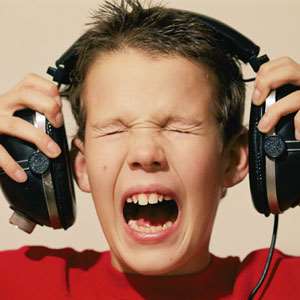
We all surely remember what our parents drilled into our brains about listening to loud music: Turn that down or you'll go deaf! As it turns out, the prevalence of young people suffering from hearing loss thanks to loud music may be much lower than previously believed, according to a new report published in the Journal of Speech, Language, and Hearing Research. Although the latest findings go against recent research, the researchers warned that we should still be cautious of our exposure to loud noises over time.
The paper's authors, from the University of Minnesota, believe that conventional hearing tests are producing false positives when measuring low levels of hearing loss in children and teenagers. According to U of M Department of Speech-Language-Hearing Sciences professor Bert Schlauch, who headed the study, 10 percent or more of children are falsely identified as having noise-related hearing loss this way.
The team also used computer simulations to estimate rates of false positives and determined that it's still possible to get reasonable estimates of the prevalence of hearing loss. These results are consistent with the findings published in the Journal of the American Medical Association (JAMA) last month, which suggested that kids and teenagers do suffer higher rates of hearing loss as a result of exposure to loud noises.
They then demonstrated this in action via a study that doesn't appear in the paper. Schlauch's team tested the U of M marching band using the traditional methods, and diagnosed 15 percent of them with “apparent noise-induced hearing loss.” However, after following them for a year, more than half of the diagnosed hearing losses appeared to go away—a finding that the team says is consistent with measurement error.
Concerns about childhood hearing loss have been amplified in recent years thanks to the proliferation of personal music players. In 2006, Apple was sued for selling a device—the iPod—that could result in hearing loss, even though the plaintiff in that case did not claim to have suffered any kind of hearing loss of his own. That case was eventually dismissed because an iPod can be used in a manner that wouldn't cause hearing loss, but debates about whether music players need lower default music settings have stayed strong.
Even though the real problem may be far lower than what the JAMA study claimed, the U of M researchers warn that we shouldn't just start cranking our iPods back up again.
“Our findings do not mean that people should not be concerned about exposure to loud sounds, such as those from personal stereo devices, live music concerts or gun fire,” Schlauch said. “The damage may build up over time and not appear until a person is older. For all sounds, the risk increases the more intense the sound and the longer the exposure, particularly from sustained or continuous sounds.”




 Ghana’s economic crisis was caused by government borrowing - the central bank di...
Ghana’s economic crisis was caused by government borrowing - the central bank di...
 EU to ban artificial smoky snack flavourings over cancer fears
EU to ban artificial smoky snack flavourings over cancer fears
 World’s oldest termite mounds discovered in South Africa – and they’ve been stor...
World’s oldest termite mounds discovered in South Africa – and they’ve been stor...
 How to avoid being hacked: start by upping your password game – ‘12345’ doesn’t ...
How to avoid being hacked: start by upping your password game – ‘12345’ doesn’t ...
 Pope appeals for halt to DR Congo violence
Pope appeals for halt to DR Congo violence
 Ken Agyapong marks 64th birthday with philanthropic gesture
Ken Agyapong marks 64th birthday with philanthropic gesture
 Religious leaders call for further discussions on anti-gay bill
Religious leaders call for further discussions on anti-gay bill
 Jomoro: Chief urges government to rehabilitate cocoa roads at Tikobo No 2
Jomoro: Chief urges government to rehabilitate cocoa roads at Tikobo No 2
 Ghana marks Eid-ul-Adha
Ghana marks Eid-ul-Adha
 Eid-ul-Adha: Mahama appeals for prayers to win Election 2024
Eid-ul-Adha: Mahama appeals for prayers to win Election 2024
